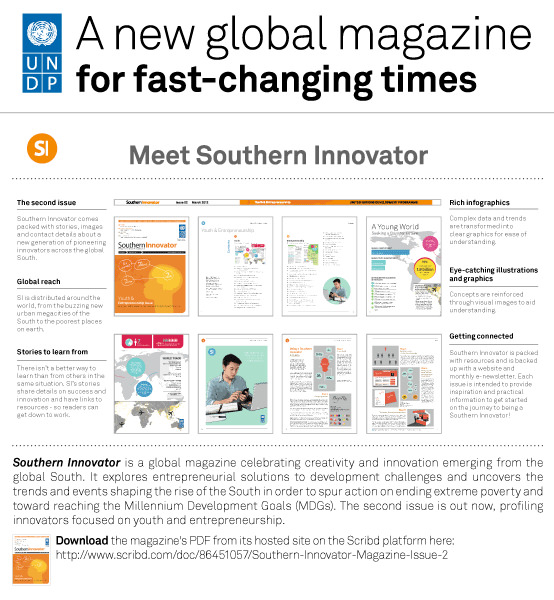Crowdfunding Technology Start-up Success in Africa
 Tuesday, June 23, 2015 at 8:41AM
Tuesday, June 23, 2015 at 8:41AM

Technology is the future for the South, and South African start-up culture is trying to get a foothold on the African continent and forge a more supportive environment for entrepreneurs and innovators.
Modelled on the successful approaches pioneered in U.S. high-technology centres like California’s Silicon Valley (http://en.wikipedia.org/wiki/Silicon_Valley) , Crowdfund (http://www.crowdfunding.co.za) aims to connect start-up technology companies with cash, experience and contacts, helping them get to the crucial prototype stage so that they can go big and go global.
It works like this: in order to build up a fund of cash to invest in start-ups, 1,000 people get together and invest R1,000 (US $128) into a Crowdfund – a pool of investment cash. A board is set up and uses the pooled cash to invest in between 10 and 20 of the best start-up ideas submitted. The ideas are funded and developed into working prototypes in return for a stake in the business. Once the working prototype is up and running, traditional venture capitalists are approached for further funding and usually Crowdfund will then cash in its equity.
The concept of crowdfunding allows groups of people to use the internet to pool their money together to help support a person or a cause (http://en.wikipedia.org/wiki/Crowd_funding) . There are now many variations on the concept, with online services providing crowdfunding for artists, designers, film-makers, causes, scientists and technology pioneers.
As a model for raising funds for small businesses, the concept has a long history in poor communities across the South. Often, it can be a group of poor women pooling their resources to help each other start small businesses. Technology in the form of the internet and mobile phones has helped the concept jump to the next level, and expanded the pool of people who can support a crowdfunded idea around the world.
It is an answer to the need for so-called “angel funding” (http://en.wikipedia.org/wiki/Angel_investor) : somebody with lots of cash who is willing to help a start-up entrepreneur. Crowdfund’s founders felt South Africa lacked enough angel funders to meet the needs of the country’s technology start-ups. This can be a big problem in countries where there is no history or culture of angel funding and searching far and wide for the “next big idea.”
In April of this year, Crowdfund was able to raise R1 million (over US $128,000) from 229 investors.
Venture capitalists (http://en.wikipedia.org/wiki/Venture_capital) – people or investment groups looking for high-growth start-ups to invest in – usually prefer to put their money into proven ideas for big, fast returns. They often lack interest in smaller ideas that may grow more slowly. It is a classic dilemma: how can an entrepreneur know if their idea will work if nobody will give them the cash to prove it?
This is a critical problem in the information age. As broadband technology spreads across Africa, the opportunities for online businesses will just grow and grow. But few will be able to benefit and African start-ups will not stand a chance against global competition if funding is not available to nurture new businesses.
Crowdfund assesses ideas and identifies skill shortfalls. The cash is used to help with the skills shortage, provide office space, bandwidth, hosting and mentorship. The funded team will also have access to legal, marketing and management experts to get through the development stage and avoid costly mistakes. The development process in stage one takes three months. The Crowdfund Board will then search for potential investors to take the start-up to stage two and a working prototype.
By this stage negotiations will take place to set the start-up off on the path to global success. They are helped with the tricky negotiation process with investors.
Apart from the start-up cash, the powerful idea behind Crowdfund is the network of support and advice that comes with it. Two of the board members are South Africans based in San Francisco, USA, and can make that crucial connection with the buzzing U.S. technology scene. Investors are asked to mentor the start-up concepts, meaning start-ups are accessing normally costly business advice.
Crowdfund tries to get a response back to potential start-ups within 48 hours (http://digitalgarage.co.za/2010/04/12/filtering-the-applications-for-funding/) , so, if you have a great idea, get submitting!
By David South, Development Challenges, South-South Solutions
Published: June 2010
Development Challenges, South-South Solutions was launched as an e-newsletter in 2006 by UNDP's South-South Cooperation Unit (now the United Nations Office for South-South Cooperation) based in New York, USA. It led on profiling the rise of the global South as an economic powerhouse and was one of the first regular publications to champion the global South's innovators, entrepreneurs, and pioneers. It tracked the key trends that are now so profoundly reshaping how development is seen and done. This includes the rapid take-up of mobile phones and information technology in the global South (as profiled in the first issue of magazine Southern Innovator), the move to becoming a majority urban world, a growing global innovator culture, and the plethora of solutions being developed in the global South to tackle its problems and improve living conditions and boost human development. The success of the e-newsletter led to the launch of the magazine Southern Innovator.
Follow @SouthSouth1
Slideshare: http://www.slideshare.net/DavidSouth1/development-challengessouthsouthsolutionsjune2010issue
Southern Innovator Issue 1: https://books.google.co.uk/books?id=Q1O54YSE2BgC&dq=southern+innovator&source=gbs_navlinks_s
Southern Innovator Issue 2: https://books.google.co.uk/books?id=Ty0N969dcssC&dq=southern+innovator&source=gbs_navlinks_s
Southern Innovator Issue 3: https://books.google.co.uk/books?id=AQNt4YmhZagC&dq=southern+innovator&source=gbs_navlinks_s
Southern Innovator Issue 4: https://books.google.co.uk/books?id=9T_n2tA7l4EC&dq=southern+innovator&source=gbs_navlinks_s
Southern Innovator Issue 5: https://books.google.co.uk/books?id=6ILdAgAAQBAJ&dq=southern+innovator&source=gbs_navlinks_s

This work is licensed under a
Creative Commons Attribution-Noncommercial-No Derivative Works 3.0 License.

